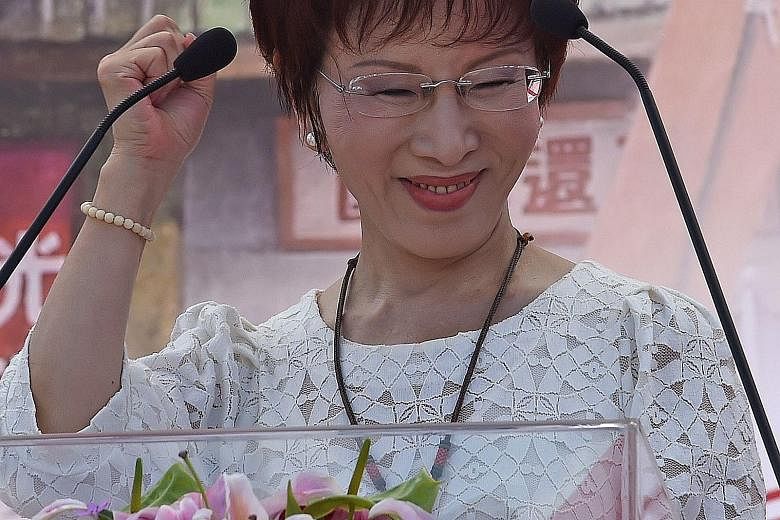TAIPEI • Known as "xiao-la-jiao" or "little hot pepper" for her straight- talking style, Taiwan's unlikely presidential hopeful Hung Hsiu-chu encapsulates the crisis facing the ruling Kuomintang (KMT) and the divisions in the island's politics.
Ms Hung's conservative pro-China views are at odds with public sentiment and have even alienated some in her own party.
However, her nomination for the leadership is still expected to be endorsed by the KMT as the party's traditional big hitters opt to stay on the sidelines of what is expected to be an electoral defeat.
The Beijing-friendly party is tipped to lose January's leadership vote as it battles public fears over increased Chinese influence and a stagnating economy.
If confirmed, Ms Hung's candidacy would set up a showdown with seasoned operator Tsai Ing-wen, chairman of the Beijing-sceptic main opposition Democratic Progressive Party (DPP), with Taiwan's China policy at the heart of the duel.
Though independent candidates will also enter the race to be president, observers say the two women will be the front runners.
Ms Hung, 67, who is deputy parliamentary speaker, had her June nomination backed by the KMT's standing committee and it looks likely to be passed at its congress on July 19, in the absence of other candidates.
"Now that this opportunity has unexpectedly come her way Hung is going for it. But she is not a polished performer or someone with a detailed policy platform," said associate professor Jonathan Sullivan at the University of Nottingham's China Policy Institute.
"Her nomination has many KMT politicians worried, either because they dislike her political views or view her as an impending disaster."
She has already been chastised by the KMT leadership for giving confusing statements on her pro-unification "one China" strategy, which has also alarmed party moderates.
Yet the party has little choice as it struggles to find a fresh face to lead its presidential campaign.
"The other (possible) candidates belong to the old guard and that would have been even less credible," said Mr Jean-Pierre Cabestan, professor of political science at Hong Kong's Baptist University.
"There's also the gender issue, the fact that it's a woman. Having two women fighting for this position is unprecedented."
Ms Hung not only illustrates the split within the KMT, where pro-China voices clash with the more moderate camp, but also the wider political polarisation over the island's approaches to Beijing.
Taiwan split from China in 1949 after a civil war and is self-ruling, but Beijing still sees the island as part of its territory awaiting reunification, by force if necessary.
Since President Ma Ying-jeou of the KMT came to power in 2008, ties with China have warmed, leading to various trade deals and a tourism boom.
But there is growing public unease over closer relations which many voters feel have benefited big business rather than ordinary citizens. Discontent led to rallies last year and a student-led occupation of the island's Parliament over a trade deal with China that critics said had been signed in secret.
Concern over China policy was also a major factor in the resounding defeat of the KMT during local elections last November, the party's worst loss.
The DPP's Ms Tsai says she will seek public consensus but has also pledged to maintain the "status quo" with Beijing if she were to be elected - a policy aimed at soothing nerves in the United States, Taiwan's biggest ally, and an acknowledgement of the need to cooperate with China economically.
AGENCE FRANCE-PRESSE

